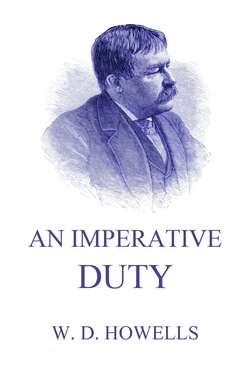Читать книгу An Imperative Duty - William Dean Howells - Страница 6
На сайте Литреса книга снята с продажи.
ОглавлениеIII
There came a shattering knock at his door, such as rouses you in the night when the porter mistakes your number for that of the gentleman he was to call at four. Olney shouted, "Come in!" and sat waiting the result, with his shoe still in his hand. The door opened and one of those Irish faces showed itself.
"Are you a doctor, sor?"
"Yes."
"Ahl right."
The face was withdrawn, and the door was closing, when Olney called out: "Why? What of it? Does any one want me?"
"I don't know, sor. There's a lady in Twenty-wan that sah your name in the paper; but she said not to disturb ye if ye wahsn't a doctor."
"A lady?" said Olney. He rapidly reasoned that the lady, whoever she was, had found his name printed in the Sunday papers among the arrivals at that hotel, and that she must have some association with it."Is she ill? Does she know me?"
"I don't know, sor," said the man, with an air of wishing to conceal nothing. "She don't be in bed, annyway."
Olney reflected a moment, hesitating between a cer- tain vexation at being molested with this ridiculous message and a vague curiosity to find out who the lady could be. As a man, he would have wished to know who any unknown woman could be; as a man of science, he divined that this unknown woman was probably one of those difficult invalids who have to be coaxed into anything decisive, even sending for a doctor; this tentative question of hers must represent ever so much self-worry and a high degree of self-conquest.
"Tell her, yes, I'm a doctor," he said to the man. He added, for purposes of identification, "Dr. Edward Olney." He thought for an instant he would send his card; but he decided this would be silly.
"Ahl right, sor. Thank ye, sor," said the man.
He went away, and Olney put on the shoe he had taken off, and got into his coat again. He expected the man back at once, and he wished to be ready, but the messenger did not come for ten or twelve minutes. Then he brought Olney a note, superscribed in a young-lady-like hand, and diffusing when opened a perfume which was instantly but indefinitely memoriferous. Where had he last met the young lady who used that perfume, so full of character, so redolent of personality? The mystery was solved by the note, and all the pleasure of the writer's presence returned to him at the sight of her name.
"DEAR SIR,--My aunt, Mrs. Meredith, is so very far from well, that she asks me to write for her, and beg you to come and see her. She hopes she is not mistaken in thinking it is Dr. Olney whom she met at Professor Garofalo's in Florence last winter; but if it is not, she trusts you will pardon the intrusion, otherwise unwarrantable at such an hour.
Yours very truly,
RHODA ALDGATE."
"Where is the room?" Olney demanded, putting the note into his breast pocket, and taking up his hat. He smiled to think how much less distinctive the diction was than the perfume; he fancied that Miss Aldgate had written down her aunt's words, which had a formality alien to the nature of the young girl he remembered so agreeably. As he followed along through the apparently aimless corridors, up and down short flights of steps that seemed to ascend at one point only to descend at another, he recalled the particulars of her beauty; her slender height, her rich complexion of olive, with a sort of under-stain of red, and the inky blackness of her eyes and hair. Her face was of almost classic perfection, and the hair, crinkling away to either temple, grew low upon the forehead, as the hair does in the Clytie head. In profile the mouth was firmly accented, with a deep cut outlining the full lower lip, and a fine jut forward of the delicate chin; and the regularity of the mask was farther relieved from insipidity by the sharp wing-like curve in the sides of the sensitive nostrils. Olney recalled it as a mask, and he recalled his sense of her wearing this family face, with its somewhat tragic beauty, over a personality that was at once gentle and gay. The mask, he felt, was inherited, but the character seemed to be of Miss Aldgate's own invention, and expressed itself in the sunny sparkle of her looks, that ran over with a willingness to please and to be pleased, and to consist in effect of a succession of flashing, childlike smiles, showing between her red lips teeth of the milkiest whiteness, small, even and perfect. These looks, the evening he remembered first meeting her and her aunt, were employed chiefly upon a serious young clergyman, sojourning in Florence after a journey to the Holy Land. But they were not employed coquettishly so much as sympathetically, with a readiness for laughter that broke up the inherited mask with a strange contradictory levity. Olney was himself immersed in a long and serious analysis of Romola with the aunt, who appeared to have a conscience of prodigious magnifying force, cultivated to the last degree by a constant training upon the ethical problems of fiction. She brought its powerful lenses to bear upon the most intimate particles of Tito's character; his bad qualities seemed to give her almost as much satisfaction as if they had been her own. In knocking at Mrs. Meredith's door, he now remembered bow charmingly that pretty little head of Miss Aldgate's, defined by the black hair with its lustrous crinkle, was set upon her shoulders.
